Kayla Jameth's Blog, page 8
August 13, 2014
The Bucket List by Douglas Black
Hello, Kayla, long time no see!
Great to have you here, Douglas. I see you've brought a lovely cover and a sexy excerpt.
Thanks for having me over to your blog. I’m here today to talk about bucket lists. I know, I know, this is a bit of a departure from your more usual historical posts (all of which I love reading!) but bear with me while I rant because I have a little proposition for you and all the lovely visitors to your blog! Exciting, huh?
 The concept of bucket lists was the inspiration behind my latest novella, imaginatively titled (I’m sure you’ll agree) The Bucket List. In the story, main character Kade gets dumped and his friends write him a bucket list to help him break out of his shell and start having fun again. Kade is a reluctant participant in this challenge, but participate he does and it changes his world more than he ever thought it could.
The concept of bucket lists was the inspiration behind my latest novella, imaginatively titled (I’m sure you’ll agree) The Bucket List. In the story, main character Kade gets dumped and his friends write him a bucket list to help him break out of his shell and start having fun again. Kade is a reluctant participant in this challenge, but participate he does and it changes his world more than he ever thought it could.
I would imagine the concept of bucket lists needs no introduction, but for those of you who have come this far in life living under a rock, let me briefly explain anyway.
When you write a bucket list, you write down all the places you want to go and all the things you want to see, do and achieve before you shuffle off this mortal coil. In doing this, inevitably you realize just how much there is out there to do and how little time there might be to do it all in, but that’s part of the fun! That’s the challenge of bucket lists and, I suppose, of life in general.
They say that writing a bucket list focuses your attention on what you want to achieve in life and, from personal experience, I can say that’s true. We all know that it can be far too easy to get bogged down in life’s little details and end up forgetting the bigger picture, and it’s also far too easy and oftentimes far more comfortable just to stick to what we know instead of seeking out new experiences.
I’m sure I’m not the only person ever to find myself standing on New Year’s Eve with a drink in my hand, wondering where on earth the year went and what I did with it. In fact, that’s happened to me more than once, usually when I’ve had a very busy year work-wise, and it’s not a nice feeling. It makes you wonder what you’re doing with your life, where you’re going wrong and what you’re going to do about it. And those are not the questions a person should be trying to answer five minutes before midnight on the last night of an old year.
I was still a student at university when I wrote my first bucket list. I wrote it to remind myself that there was more to life than just studying. Over the years, I’ve returned to it, rewriting it or retyping it whenever I’ve felt that I’m losing sight of all the things I want to achieve and, you know something? The years where I’ve paid extra special attention to my bucket list have never ended with me looking back and wondering where all the days have gone, as the chords of Auld Lang Syne start to ring out. Sure, I’m still aware of time passing by, far too quickly for my liking, but at least more often than not it feels like I’m managing to cling on for the ride.
You can probably guess what my proposition is. I challenge you, each and every one of you, to take a pen and a scrap of paper and have a go at writing your own bucket list. Unlike Kade in my new novella, I can’t promise that it will turn your world completely upside down, introduce you to the sort of Australian surfer-guy that dreams are made of, and generally set you up on a path that might lead to a hot, exciting new life, BUT, I can promise that it will make you think.
Take an hour. Go to a coffee shop. Order your favourite drink and arrange some sheets of paper in front of you. First things first, do what all good writers do and spend the next twenty minutes staring out of the window, procrastinating. Then, start writing. List down all the places you want to see, even if you have no idea how you’ll ever be able to afford to travel there. Write down all the things you want to do and learn and own and achieve. I promise you, you won’t regret it. If you’re anything like me you’ll realize that there’s a lot more that you want to do than you expected there to be, and you’ll also see that if you make a few changes you can begin to understand how it might just be possible to start ticking a few things off that list. Take my word for it: that’s an incredibly exciting place to find yourself in!
Oh, and if you’re in need of inspiration, might I suggest you could do worse than to have a little glance at The Bucket List?
The Bucket List was released by Loose Id Publishing in August 2014. It is also available from Amazon.

Blurb: When Kade Doherty gets dumped, he expects sympathy from his friends. Instead, he gets a bucket list. His friends want to help him enjoy life again, but Kade isn’t convinced a list of outlandish leisure pursuits will help much with that. To keep the peace he goes along with the plan and in the process, he meets Blake.
Blake’s Australian accent and surfer-boy looks are the stuff of sexual fantasies and Kade surprises everyone – including himself – when he wastes no time making a move.
Kade goes with Blake into the Scottish highlands, but just as he is beginning to get used to life with his very own Mr. Australia, reality comes knocking. Kade’s newfound happiness falls apart when his abusive ex demands they meet. Blake senses something is wrong and he wants to help, but Kade knows he can’t confide in Blake.
After all, Kade hasn’t exactly been honest. He might feel like a different man when he’s with Blake, but Kade knows he’s still just an accountant from Glasgow with slight obsessive compulsions and a bucket list that someone else wrote. He knows Blake won’t hang around, let alone help, when he finds out the truth.
Or will he?
Excerpt: Kade made his way slowly over to Blake, keeping close to the relative calm of the curving bar. He stepped in beside his Mr. Australia. Blake didn’t turn to look at him.
Kade assumed that, even given the circumstances, it was still acceptable to start with, “Hello.”
Blake turned his head, and Kade felt that warmth he had felt with his back to the fish tanks in the Asian supermarket. “Hi,” Blake said, his voice deep enough to carry against the music.
He turned, opening up his body and inviting Kade to step closer. Kade did. He wanted to, wanted to see if that strange connection he had felt earlier was still there between them.
“Who’s your friend?” Kade asked.
Blake just shrugged. “Don’t know. Just some kid. Art student, apparently. He was a good dancer, though.”
“Not a good kisser?”
Blake looked Kade up and down, taking his time doing so. Kade had always thought the idea that someone could undress you with their eyes was a concept fit only for the cheap romance novels his mum used to read, but he couldn’t think of a better way to describe what Blake’s eyes had just done to him. The words needed to describe how that made Kade feel wouldn’t be fit for polite company. Not that Kade was really in polite company.
“I wouldn’t know. Didn’t want to kiss him.” Blake reached out and stroked his hand down Kade’s right arm, from his shoulder to his wrist. He left it there for a few moments, holding tight, and then he pulled Kade’s wrist toward him. Kade’s hand landed on Blake’s hip, his thumb teasing Blake’s tight, strong stomach muscles. When Blake let go, Kade didn’t move his hand away.
“Why didn’t you want to?” Kade couldn’t stop staring into those bright blue eyes.
Blake shrugged and wrapped the hand that had been around Kade’s wrist around Kade’s neck. “He’s not my type. And I was hoping I would meet someone else here tonight. I thought it was a long shot, but I didn’t want to take the risk and ruin my chances.”
Despite his recent drink, Kade’s throat felt dry. He didn’t even care if that was a lie. Blake’s strong fingers rubbed Kade’s neck just below his hairline.
“Who were you hoping to meet?” Kade asked.
Blake tugged him in close so their bodies were pressing together. Kade’s hand slipped around to Blake’s back, holding on tight as Blake put his lips to the side of Kade’s neck.
“You,” Blake whispered. They were so close to the loudspeakers that the word should have been lost, but Kade heard that loaded syllable and felt it translate like heat through his body, like he had just stepped into a hot bath.
“Are you here with somebody?”
Kade shook his head. He felt Blake spread his legs. There was barely any distance left between them.
“Then would you mind if I did this?”
Kade turned his head to find Blake’s lips less than an inch away from his own. He smiled and tried for one of those winks he was so not used to giving, and then let Blake close the distance between them.
 Author Biography:
Douglas Black was born and raised in bonnie Scotland. An archaeologist by trade, Douglas started writing MM erotica - as a means of avoiding starvation at university - before returning to the genre in 2012.
Author Biography:
Douglas Black was born and raised in bonnie Scotland. An archaeologist by trade, Douglas started writing MM erotica - as a means of avoiding starvation at university - before returning to the genre in 2012.
Welcome to your fantasy.
Author Links Blog: http://douglasblackerotica.wordpress.com/Amazon: http://www.amazon.co.uk/Douglas-Black/e/B00A93HUHO/ref=sr_ntt_srch_lnk_1?qid=1406885803&sr=8-1Facebook Author Page: https://www.facebook.com/pages/Douglas-Black/1632968396841732 Twitter: @DBlackErotica
Great to have you here, Douglas. I see you've brought a lovely cover and a sexy excerpt.
Thanks for having me over to your blog. I’m here today to talk about bucket lists. I know, I know, this is a bit of a departure from your more usual historical posts (all of which I love reading!) but bear with me while I rant because I have a little proposition for you and all the lovely visitors to your blog! Exciting, huh?
 The concept of bucket lists was the inspiration behind my latest novella, imaginatively titled (I’m sure you’ll agree) The Bucket List. In the story, main character Kade gets dumped and his friends write him a bucket list to help him break out of his shell and start having fun again. Kade is a reluctant participant in this challenge, but participate he does and it changes his world more than he ever thought it could.
The concept of bucket lists was the inspiration behind my latest novella, imaginatively titled (I’m sure you’ll agree) The Bucket List. In the story, main character Kade gets dumped and his friends write him a bucket list to help him break out of his shell and start having fun again. Kade is a reluctant participant in this challenge, but participate he does and it changes his world more than he ever thought it could. I would imagine the concept of bucket lists needs no introduction, but for those of you who have come this far in life living under a rock, let me briefly explain anyway.
When you write a bucket list, you write down all the places you want to go and all the things you want to see, do and achieve before you shuffle off this mortal coil. In doing this, inevitably you realize just how much there is out there to do and how little time there might be to do it all in, but that’s part of the fun! That’s the challenge of bucket lists and, I suppose, of life in general.
They say that writing a bucket list focuses your attention on what you want to achieve in life and, from personal experience, I can say that’s true. We all know that it can be far too easy to get bogged down in life’s little details and end up forgetting the bigger picture, and it’s also far too easy and oftentimes far more comfortable just to stick to what we know instead of seeking out new experiences.
I’m sure I’m not the only person ever to find myself standing on New Year’s Eve with a drink in my hand, wondering where on earth the year went and what I did with it. In fact, that’s happened to me more than once, usually when I’ve had a very busy year work-wise, and it’s not a nice feeling. It makes you wonder what you’re doing with your life, where you’re going wrong and what you’re going to do about it. And those are not the questions a person should be trying to answer five minutes before midnight on the last night of an old year.
I was still a student at university when I wrote my first bucket list. I wrote it to remind myself that there was more to life than just studying. Over the years, I’ve returned to it, rewriting it or retyping it whenever I’ve felt that I’m losing sight of all the things I want to achieve and, you know something? The years where I’ve paid extra special attention to my bucket list have never ended with me looking back and wondering where all the days have gone, as the chords of Auld Lang Syne start to ring out. Sure, I’m still aware of time passing by, far too quickly for my liking, but at least more often than not it feels like I’m managing to cling on for the ride.
You can probably guess what my proposition is. I challenge you, each and every one of you, to take a pen and a scrap of paper and have a go at writing your own bucket list. Unlike Kade in my new novella, I can’t promise that it will turn your world completely upside down, introduce you to the sort of Australian surfer-guy that dreams are made of, and generally set you up on a path that might lead to a hot, exciting new life, BUT, I can promise that it will make you think.
Take an hour. Go to a coffee shop. Order your favourite drink and arrange some sheets of paper in front of you. First things first, do what all good writers do and spend the next twenty minutes staring out of the window, procrastinating. Then, start writing. List down all the places you want to see, even if you have no idea how you’ll ever be able to afford to travel there. Write down all the things you want to do and learn and own and achieve. I promise you, you won’t regret it. If you’re anything like me you’ll realize that there’s a lot more that you want to do than you expected there to be, and you’ll also see that if you make a few changes you can begin to understand how it might just be possible to start ticking a few things off that list. Take my word for it: that’s an incredibly exciting place to find yourself in!
Oh, and if you’re in need of inspiration, might I suggest you could do worse than to have a little glance at The Bucket List?
The Bucket List was released by Loose Id Publishing in August 2014. It is also available from Amazon.

Blurb: When Kade Doherty gets dumped, he expects sympathy from his friends. Instead, he gets a bucket list. His friends want to help him enjoy life again, but Kade isn’t convinced a list of outlandish leisure pursuits will help much with that. To keep the peace he goes along with the plan and in the process, he meets Blake.
Blake’s Australian accent and surfer-boy looks are the stuff of sexual fantasies and Kade surprises everyone – including himself – when he wastes no time making a move.
Kade goes with Blake into the Scottish highlands, but just as he is beginning to get used to life with his very own Mr. Australia, reality comes knocking. Kade’s newfound happiness falls apart when his abusive ex demands they meet. Blake senses something is wrong and he wants to help, but Kade knows he can’t confide in Blake.
After all, Kade hasn’t exactly been honest. He might feel like a different man when he’s with Blake, but Kade knows he’s still just an accountant from Glasgow with slight obsessive compulsions and a bucket list that someone else wrote. He knows Blake won’t hang around, let alone help, when he finds out the truth.
Or will he?
Excerpt: Kade made his way slowly over to Blake, keeping close to the relative calm of the curving bar. He stepped in beside his Mr. Australia. Blake didn’t turn to look at him.
Kade assumed that, even given the circumstances, it was still acceptable to start with, “Hello.”
Blake turned his head, and Kade felt that warmth he had felt with his back to the fish tanks in the Asian supermarket. “Hi,” Blake said, his voice deep enough to carry against the music.
He turned, opening up his body and inviting Kade to step closer. Kade did. He wanted to, wanted to see if that strange connection he had felt earlier was still there between them.
“Who’s your friend?” Kade asked.
Blake just shrugged. “Don’t know. Just some kid. Art student, apparently. He was a good dancer, though.”
“Not a good kisser?”
Blake looked Kade up and down, taking his time doing so. Kade had always thought the idea that someone could undress you with their eyes was a concept fit only for the cheap romance novels his mum used to read, but he couldn’t think of a better way to describe what Blake’s eyes had just done to him. The words needed to describe how that made Kade feel wouldn’t be fit for polite company. Not that Kade was really in polite company.
“I wouldn’t know. Didn’t want to kiss him.” Blake reached out and stroked his hand down Kade’s right arm, from his shoulder to his wrist. He left it there for a few moments, holding tight, and then he pulled Kade’s wrist toward him. Kade’s hand landed on Blake’s hip, his thumb teasing Blake’s tight, strong stomach muscles. When Blake let go, Kade didn’t move his hand away.
“Why didn’t you want to?” Kade couldn’t stop staring into those bright blue eyes.
Blake shrugged and wrapped the hand that had been around Kade’s wrist around Kade’s neck. “He’s not my type. And I was hoping I would meet someone else here tonight. I thought it was a long shot, but I didn’t want to take the risk and ruin my chances.”
Despite his recent drink, Kade’s throat felt dry. He didn’t even care if that was a lie. Blake’s strong fingers rubbed Kade’s neck just below his hairline.
“Who were you hoping to meet?” Kade asked.
Blake tugged him in close so their bodies were pressing together. Kade’s hand slipped around to Blake’s back, holding on tight as Blake put his lips to the side of Kade’s neck.
“You,” Blake whispered. They were so close to the loudspeakers that the word should have been lost, but Kade heard that loaded syllable and felt it translate like heat through his body, like he had just stepped into a hot bath.
“Are you here with somebody?”
Kade shook his head. He felt Blake spread his legs. There was barely any distance left between them.
“Then would you mind if I did this?”
Kade turned his head to find Blake’s lips less than an inch away from his own. He smiled and tried for one of those winks he was so not used to giving, and then let Blake close the distance between them.
 Author Biography:
Douglas Black was born and raised in bonnie Scotland. An archaeologist by trade, Douglas started writing MM erotica - as a means of avoiding starvation at university - before returning to the genre in 2012.
Author Biography:
Douglas Black was born and raised in bonnie Scotland. An archaeologist by trade, Douglas started writing MM erotica - as a means of avoiding starvation at university - before returning to the genre in 2012.Welcome to your fantasy.
Author Links Blog: http://douglasblackerotica.wordpress.com/Amazon: http://www.amazon.co.uk/Douglas-Black/e/B00A93HUHO/ref=sr_ntt_srch_lnk_1?qid=1406885803&sr=8-1Facebook Author Page: https://www.facebook.com/pages/Douglas-Black/1632968396841732 Twitter: @DBlackErotica
Published on August 13, 2014 19:18
July 11, 2014
Spartan Myths - All Slaves Are Alike
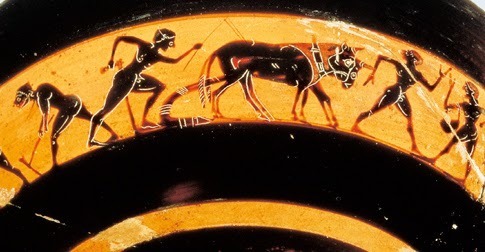 That is mostly true in the ancient world. As Lisa Henry pointed out, Roman slaves were chattel. Meaning they were property, an item to be owned, not quite human any more.
That is mostly true in the ancient world. As Lisa Henry pointed out, Roman slaves were chattel. Meaning they were property, an item to be owned, not quite human any more.Things in Sparta were a bit different. Did I hear someone sigh and mutter, "Of course"?
I did warn you, even the other Greeks thought the Spartans were weird. But don't say it to their faces. The biggest badasses on the block can be as weird as they want to be.
So Spartan slaves. They more or less were owned by the polis (city-state) of Sparta and were comprised of the previous landowners. When the Dorian tribe that later became known as the Spartans invaded Lacedaemonia, they enslaved the previous inhabitants.
This new class of slaves, called helots, was unprecedented in the rest of the world. First they couldn't be bought or sold at the whim of their "master" because they didn't really have a master. Helots belonged collectively to the state not unlike mediaeval serfs.
Most were assigned to a plot of land (klēros). They were expected to give a set portion of the bounty of their fields to the Spartiate (Spartan citizen, i.e. adult male) the land was allotted to. Almost as if the land provided everything the Spartan needed, including the wherewithal to tend itself.
As long as their quotas were met, they were given an amazing amount of leeway in their lives.
Secondly, Helots were allowed to marry as they chose and raised their children with little to no fear they could be sold at any time, unlike chattel slaves. Some of the agrarian helots found themselves performing more traditional roles in Spartiatehouseholds. But even there they were not subject to some of the harsher realities of slavery.
But it wasn't all sunshine and roses.
One of the few things the Spartans worried about was a helot revolt. Helots vastly outnumbered the dwindling Spartan population. So in an effort to keep the helots subdued and "cut off the head of the snake", every autumn, the ephorsdeclared war on the helots. This meant that a Spartan could kill any helot without risk of bloodguilt/ritual pollution.
This usually translated into some of the more promising young warriors in training being sent into the countryside with just a knife and the clothing on their back. The youths (18-19 years old) known as kryptes were expected to use stealth to steal what they needed to survive, spy on the helots and stalk their prey.
Any helot caught outside after dark was killed, as were any helots who were respected enough to be considered possible leaders for a revolt. The young men also targeted the best and the strongest as a way to show off their training.
Through terrorization, some but not all revolts were kept in check.
So the helots had in some ways the best life a slave could hope for in the ancient world, but it came at an equally terrible price.
Published on July 11, 2014 19:21
June 28, 2014
History, Slavery and He Is Worthy by Lisa Henry
It's my pleasure to welcome Lisa Henry the author of He Is Worthy, a m/m story set in Imperial Rome. One of the characters is a Germanic captive and slave. (Sorry, Aenor! Bructeri, not German.)
History, Slavery, and He is Worthy.
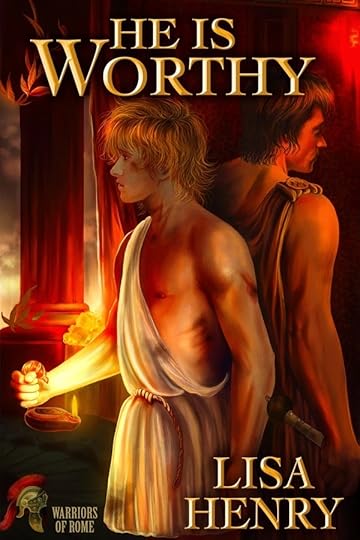 I’ve always been drawn to historical fiction.
I’ve always been drawn to historical fiction.
History is every story ever told, after all, and people have been motivated by the same things since the beginning of time: greed, love, ambition, lust. In that sense, history is only the window dressing. It’s us, it’s always us, whatever silly clothes we’re wearing.
But that’s also an oversimplification, because people from different time periods also have fundamentally different philosophies. In the past, people could go to an arena and watch other people get ripped apart by wild animals. Great entertainment. Tell you what, I’ll save the seats. Bring the kids!
Sometimes, the challenge in writing historical fiction is in taking those very foreign beliefs, stuffing them in characters, and hoping readers will still give those characters a chance. The two big issues I faced when I was writing my historical He is Worthy , set in Imperial Rome, were the age of consent, and slavery.
In Ancient Rome, a boy was considered a man at fourteen. It wasn’t uncommon for girls to marry at twelve or thirteen. In modern society we consider that abhorrent, and rightly so. But in most ancient societies the same standard does not apply. In fact, it took until the Victorian era for “childhood” to be romanticised as a time of innocence and purity. And then, only for the emerging middle classes. Working class kids? Get ’em down the mines or up the chimneys while they’re still small enough to fit.
Aenor, one of my main characters in He is Worthy , is chosen to be a pleasure slave for Nero. He’s nineteen; he could still be a boy by our definition, but certainly not by Nero’s. So I made his age something to be remarked upon, something to be unhappy about.
The master sighed, narrowing his eyes at Aenor. “And make him . . .” He waved his hand. “He’s too old for pretty. Make him look strong. He’s hardly a keeper, but I’m sure he can put on a good show.”
The age of consent difficulty neatly sidestepped, I then turned to the issue of slavery. The Roman Empire was built on military expansion and the acquisition of slaves. Slaves were forbidden from wearing uniforms, it’s said, because if they looked around and realised their superior numbers, they could easily overthrow their Roman masters.
Slavery in the ancient world was not seen as a moral issue. It followed one rule only: might is right. People weren’t made slaves because of ethnicity or some of the more ludicrous pseudo-scientific theories thrown around in the 1800s that basically justified slavery as white is right.
Aenor, a Bructeri tribesman, is a slave because he and his cousins ran afoul of some Roman legionaries. Aenor hates Romans, but he hated them long before they enslaved him. And while his enslavement is unjust – Aenor committed no crime – Aenor certainly never rails against the institution of slavery. A world without slavery would be a totally foreign concept to him, as it would be for any occupant of Ancient Rome.
One thing I wanted to do in He is Worthy was to show that there was no standard way of treating slaves in Imperial Rome. Many slaves were educated, wealthy, and dressed as well as their masters. Aenor initially mistakes such a slave, Callistus, as his master. Many slaves, of course, were brutalised. The pleasure slave Nero pampers as his favourite – Sporus, a real historical figure – reminded Nero so much of his dead wife that he castrated the boy and then married him.
At the other end of the scale are the slaves owned by my other main character, Novius Senna. Senna is a Roman nobleman.
[Senna] told himself he didn’t enjoy pointless cruelty, not even against slaves. His father had raised him to treat slaves fairly. They weren’t cheap, after all, especially the pretty ones. Why buy them just to sacrifice them to strange pleasures? To use a slave to the point of injury or death made bad economic sense.
But there’s more to Senna that the economic rationalisation:
The children in the atrium belonged to the household slaves. They were slaves themselves. They played in the atrium because Senna didn’t care, or pretended not to care. He liked to hear the sound of laughter filtering through the house, even though Felix, his secretary, always shooed the children away when he found them there. Get away with you, little monkeys! If the master finds you here, he will have you whipped! Lies.
Slavery, in Ancient Rome, could be inherited. If your mother was a slave, then you were a slave. It could also be brought about by war, or imposed as a punishment by the judicial system. In a world where everyone’s life could be short and brutal, to be a slave was not necessarily a worse fate than any other. Children were sometimes left on the side of the street to be claimed as slaves. The lucky ones would be fed, housed, educated and valued as investments. The unlucky? They were probably no worse off than living in the slums anyway.
Slavery may be repugnant to our modern ideology – although let’s not pretend that it doesn’t exist anymore – but the Romans weren’t the first, or the last, to build an empire on it. In the scope of the millennia, it’s probably more unusual to live in a world where most people believe in crazy things like personal freedom and human rights.
Most importantly when it comes to history, I think that we can’t judge it from our modern standards. It’s not that simple. What we can do, though, is learn from history. Always.
Thank you for joining me today, Lisa! As a bit of a history geek, I enjoy learning more about history from fellow enthusiasts.
But don't think that Lisa only writes historical fiction such as He Is Worthy. Dark Space, one of my favorites she has written, is a SciFi. And of course, there is The Island, a contemporary.
History, Slavery, and He is Worthy.
 I’ve always been drawn to historical fiction.
I’ve always been drawn to historical fiction. History is every story ever told, after all, and people have been motivated by the same things since the beginning of time: greed, love, ambition, lust. In that sense, history is only the window dressing. It’s us, it’s always us, whatever silly clothes we’re wearing.
But that’s also an oversimplification, because people from different time periods also have fundamentally different philosophies. In the past, people could go to an arena and watch other people get ripped apart by wild animals. Great entertainment. Tell you what, I’ll save the seats. Bring the kids!
Sometimes, the challenge in writing historical fiction is in taking those very foreign beliefs, stuffing them in characters, and hoping readers will still give those characters a chance. The two big issues I faced when I was writing my historical He is Worthy , set in Imperial Rome, were the age of consent, and slavery.
In Ancient Rome, a boy was considered a man at fourteen. It wasn’t uncommon for girls to marry at twelve or thirteen. In modern society we consider that abhorrent, and rightly so. But in most ancient societies the same standard does not apply. In fact, it took until the Victorian era for “childhood” to be romanticised as a time of innocence and purity. And then, only for the emerging middle classes. Working class kids? Get ’em down the mines or up the chimneys while they’re still small enough to fit.
Aenor, one of my main characters in He is Worthy , is chosen to be a pleasure slave for Nero. He’s nineteen; he could still be a boy by our definition, but certainly not by Nero’s. So I made his age something to be remarked upon, something to be unhappy about.
The master sighed, narrowing his eyes at Aenor. “And make him . . .” He waved his hand. “He’s too old for pretty. Make him look strong. He’s hardly a keeper, but I’m sure he can put on a good show.”
The age of consent difficulty neatly sidestepped, I then turned to the issue of slavery. The Roman Empire was built on military expansion and the acquisition of slaves. Slaves were forbidden from wearing uniforms, it’s said, because if they looked around and realised their superior numbers, they could easily overthrow their Roman masters.
Slavery in the ancient world was not seen as a moral issue. It followed one rule only: might is right. People weren’t made slaves because of ethnicity or some of the more ludicrous pseudo-scientific theories thrown around in the 1800s that basically justified slavery as white is right.
Aenor, a Bructeri tribesman, is a slave because he and his cousins ran afoul of some Roman legionaries. Aenor hates Romans, but he hated them long before they enslaved him. And while his enslavement is unjust – Aenor committed no crime – Aenor certainly never rails against the institution of slavery. A world without slavery would be a totally foreign concept to him, as it would be for any occupant of Ancient Rome.
One thing I wanted to do in He is Worthy was to show that there was no standard way of treating slaves in Imperial Rome. Many slaves were educated, wealthy, and dressed as well as their masters. Aenor initially mistakes such a slave, Callistus, as his master. Many slaves, of course, were brutalised. The pleasure slave Nero pampers as his favourite – Sporus, a real historical figure – reminded Nero so much of his dead wife that he castrated the boy and then married him.
At the other end of the scale are the slaves owned by my other main character, Novius Senna. Senna is a Roman nobleman.
[Senna] told himself he didn’t enjoy pointless cruelty, not even against slaves. His father had raised him to treat slaves fairly. They weren’t cheap, after all, especially the pretty ones. Why buy them just to sacrifice them to strange pleasures? To use a slave to the point of injury or death made bad economic sense.
But there’s more to Senna that the economic rationalisation:
The children in the atrium belonged to the household slaves. They were slaves themselves. They played in the atrium because Senna didn’t care, or pretended not to care. He liked to hear the sound of laughter filtering through the house, even though Felix, his secretary, always shooed the children away when he found them there. Get away with you, little monkeys! If the master finds you here, he will have you whipped! Lies.
Slavery, in Ancient Rome, could be inherited. If your mother was a slave, then you were a slave. It could also be brought about by war, or imposed as a punishment by the judicial system. In a world where everyone’s life could be short and brutal, to be a slave was not necessarily a worse fate than any other. Children were sometimes left on the side of the street to be claimed as slaves. The lucky ones would be fed, housed, educated and valued as investments. The unlucky? They were probably no worse off than living in the slums anyway.
Slavery may be repugnant to our modern ideology – although let’s not pretend that it doesn’t exist anymore – but the Romans weren’t the first, or the last, to build an empire on it. In the scope of the millennia, it’s probably more unusual to live in a world where most people believe in crazy things like personal freedom and human rights.
Most importantly when it comes to history, I think that we can’t judge it from our modern standards. It’s not that simple. What we can do, though, is learn from history. Always.
Thank you for joining me today, Lisa! As a bit of a history geek, I enjoy learning more about history from fellow enthusiasts.
But don't think that Lisa only writes historical fiction such as He Is Worthy. Dark Space, one of my favorites she has written, is a SciFi. And of course, there is The Island, a contemporary.
Published on June 28, 2014 06:56
June 22, 2014
Spartan Myths - The Spartan Boy and the Fox
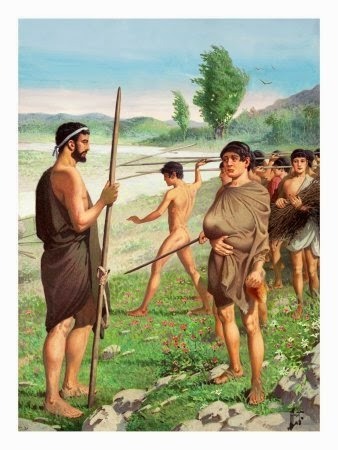 A story I remember my mom telling me when I was a kid was about a Spartan boy and a fox. I pretty much believed it word for word and could only think how brave (and later how stupid) that boy was.
A story I remember my mom telling me when I was a kid was about a Spartan boy and a fox. I pretty much believed it word for word and could only think how brave (and later how stupid) that boy was.The story goes like this:"In the case of another boy, when the time had arrived during which it was the custom for the free boys to steal whatever they could, and it was a disgrace not to escape being found out, when the boys with him had stolen a young fox alive, and given it to him to keep, and those who had lost the fox came in search for it, the boy happened to have slipped the fox under his garment. The beast, however, became savage and ate through his side to the vitals; but the boy did not move or cry out, so as to avoid being exposed, and left, when they had departed, the boys saw what had happened, and blamed him, saying that it would have been better to let the fox be seen than to hide it even unto death; but the boy said, 'Not so, but better to die without yielding to the pain than through being detected because of weakness of spirit to gain a life to be lived in disgrace.'" – Plutarch, Moralia circa 100 AD
And again:"The boys make such a serious matter of their stealing, that one of them, as the story goes, who was carrying concealed under his cloak a young fox which he had stolen, suffered the animal to tear out his bowels with its teeth and claws, and died rather than have his theft detected. And even this story gains credence from what their youths now endure, many of whom I have seen expiring under the lash at the altar of Artemis Orthia." – Plutarch, Life of Lycurgus from The Parallel Lives circa 100 AD
Plutarch was the earliest reference to the story I could find and he lived several centuries after the story originated. I'm sure the tale circulated with other sources and by word of mouth, but to my knowledge none are still extant.
How much of this was myth and is there a kernel of truth in there?
The kernel of truth:When Spartan boys joined the agōgē at the age of seven, they were kept on short rations and expected to steal what else they might need. At first, this sounds not only harsh but also encourages thievery. But as might be expected of the Spartans, that wasn't what they were trying to teach.
As an army that paid little concern to logistics, preferring to live off the land, Sparta expected the warriors to be able to forage and take what they needed from the conquered peoples. They also wanted first-in scouts to be undetectable so stealth was prized. As with their marriage customs, the expectation that the children would feed themselves through theft encouraged stealth. As did the beatings the boys earned if they were caught at it.
The floggings at the altar of Artemis Orthia are discussed in a previous post. But by Plutarch's time, the rite of passage had become such a popular blood spectacle that an amphitheater was built to accommodate the spectators. Youths (boys and young men) were beaten until they bled and it wasn't uncommon for them to die. The deaths could have been prevented if the youths had chosen disgrace and walked away. But they would have lost their status as Spartiates if they had made that decision. So they were more than capable of accepting death before disgrace. A concept that modern peoples have some difficulty with, but was not unheard of then.
Syn tai e epi tai! With it or on it! The parting words of the Spartan women when their men went to war. In other words, the warrior should return with his shield, showing he hadn't thrown it down to run from the fight. Or on it, as his body was borne home.
With this kind of ingrained training and expectations of honor vs disgrace, what choice did the Spartan boy have?
The myth? You will have to decide that for yourself.
My take on it? Propaganda for sure. But very likely with a basis in fact. The Spartans weren't known for lying or making up stories. Laconic derives from their practice of saying only what needed to be said.
Embellished over the centuries? Undoubtedly, but not by the Spartans.
Published on June 22, 2014 07:45
June 18, 2014
Taming Theron Blurb
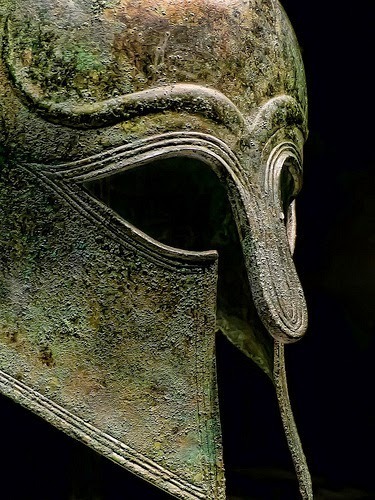
Alone, Andreas toils on a remote farmstead for a Spartan overlord. When a kryptes enters his world, Andreas fears for his life. The dread warriors stalk and kill helots—like Andreas' father—as part of their training.
To save himself, Andreas must tame the fearsome warrior.
Andreas is torn as what began as simple self-preservation turns into attraction. Yearning for the company of someone other than his ferret Ictis, he decides to trust the Spartan warrior and risk the fate that claimed his father.
Born to rule by the sword, Theron sees the world as his and acts accordingly, taking everything Andreas offers and reaching for more.
Can a lonely state-owned slave and an elite Spartan warrior find common ground? And if they do can even the gods save them from the terrible price Sparta extracts from men who desire their own sex?
Photo Credit: <a href="http://www.flickr.com/photos/44124324... via <a href="http://compfight.com">Compfig... <a href="https://creativecommons.org/licenses/...
Published on June 18, 2014 20:56
June 14, 2014
Spartan Myths - Spartan Women Had to Dress like Men to Catch a Man
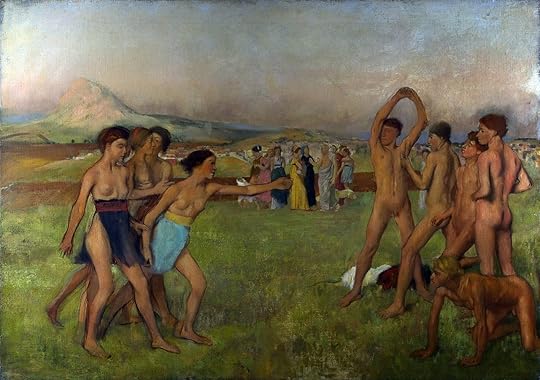 Lycurgus urged the Spartan girls to engage in wrestling.
Lycurgus urged the Spartan girls to engage in wrestling.Here they urge the boys to fight.A bit of malarkey I ran into the other day, insisted that Spartan wedding traditions were proof that Spartans were gay. On the surface, that kind of statement is absurd.
Nothing could be further from the truth. While Spartans did practice pederasty, which most people point to as their main proof of homosexuality, the practice in Sparta was purely platonic mentorship. Unlike Crete or Athens where the practice was often sexual.
In Sparta, the older man, or mentor, was considered to stand in as a foster father for the youth. They did not court the boys, as occurred elsewhere. Instead, the boy asked them to be their mentor. As a foster father, any sexual activity between the man and boy would be tantamount to incest and punished as such. The pair would be required to commit suicide or go into exile to erase the stain on Sparta's honor and to a lesser degree, their own.
This prohibition extended to any males seeking the arms of another man. Possibly because Spartans were slowly dying out and needed to increase their population to refill their ranks. Either way, the Spartans were some of the more homophobic people in ancient Greece.
Now for that wedding tradition.
Young women in Sparta had to be at least 20 years old to wed. While in the rest of Greece thirteen-year-old girls were routinely given to men up to more than twice their age. The Spartan maids cut their hair and dressed as men before going to their own bed on their wedding night. Not as one person postulated, because the Spartan men couldn't stand to touch a woman.
The young warrior had to sneak into the bed with his new wife and be gone before dawn the next day. In fact, that was the pattern of the early years of their marriage, until at age 30 he could have a home other than the barracks. Then the couple could live together for the rest of their lives.
The sneaking around was good practice for a warrior. Men who were caught visiting their wives were likely teased for not being stealthy enough, not for desiring a woman.
The Spartans were surrounded by a culture, and had probably shared the same culture at one point, that believed marriage by capture to be the norm. So much so that the tale of Hades kidnapping Persephone was a myth designed to legitimize the practice and give it the godly stamp of approval.
The practice of cutting the woman's hair may have started as a way to prevent a bride from being kidnapped on the eve of her wedding. Later, this practice likely became a rite of passage. A visible sign that she had left childhood behind, as such she would have been proud of her newly shorn hair. It also allowed men to tell at a glance who was recently wed (her hair would be short for a couple of years) and they wouldn't court another man's wife.
As you can see, putting a modern spin on an ancient and often misunderstood culture while ignoring what the people themselves did or said about the subject is misleading to say the least.
Published on June 14, 2014 11:17
June 10, 2014
Spartan Myths - Spartan Warriors Embraced Homosexuality
 I run across this photo or something similar every so often and want to say, "That's the Thebans!"
I run across this photo or something similar every so often and want to say, "That's the Thebans!"The Sacred Band of Thebes, consisting of paired erastês and erômenos, was founded by commander Gorgidas in 378 BC and fell to Philip of Macedon in 338 BC.
Greece in general, and Sparta specifically, was not the haven of homosexuality that many people wish to portray it as.
Crete, Athens, Corinth and Thebes practiced pederasty. A homosocial institute that encouraged love in a myriad of forms between an older man (erastês) and a youth (erômenos). The terms carry certain connotations that directly or indirectly influence modern views on this relationship.
The mentor, or erastês, is intended to be an older man who guides the youth through the upper echelons of society. This was a form of social networking. Erastês means "lover". This has been taken to imply a sexual relationship. Especially as erômenosmeans "beloved". These are not so much descriptions of the individuals as titles for their place in the relationship.
Were all pederastic relationships sexual? I doubt that was the case, as the vast majority of men now, and likely then, identify as straight/heterosexual. That's nothing more than statistics. Were there bisexuals and bi-curious individuals? Without a doubt, but once again not to the exclusion of straight individuals.
In ancient Greece, men, regardless of their sexual identity, were expected to marry and produce offspring. They married her and got their heirs. Then they had mistresses, went to brothels, and of course boys were an option.
Even then, there were strict rules on who, when and how. Who: Young men of the upper classes. Wouldn't do to have commoners hobnobbing with their betters. When: The youths must be beardless. Once he grew facial hair, he was no longer acceptable. He was now an equal and if the relationship continued, he lost that standing and became "womanish". How: Intercrural, where the older man places his penis between the thighs (literally, not figuratively) and rubs off on the youth. Penetration was only for inferiors, i.e. women and slaves.
So that is pederasty in the Hellenic world.
Sparta was always a bit different, but they really began to march to their own drum under Lycurgus the Lawgiver. He set up their entire social order to make them the best warriors the Hellenes ever knew.
The two kings were usurped by his ephors, becoming primarily generals and priests. All children underwent the agōgē, a strict method of schooling that produced elite warriors and strong-minded women. He changed pederasty to more of a foster father/son relationship, the titles employed to "inspirer" and "hearer", and made sexual love between the man and youth punishable by exile or suicide.
Xenophon of Athens, the only contemporary source, sent his sons to participate in the Spartan agōgē. He categorically denied any sexual aspects to the relationship in Sparta.
Aristotle further claims that the lack of homosexuality in Sparta was responsible for the deplorable way the Spartan women acted. They were literate and schooled in mathematics, song and dance, and participated in athletics. All purviews of men. Thus they were considered outrageously outspoken by the rest of the Greek world.
I'm not saying that homosexual relationships didn't occur in Sparta. After all, I've just written a series of novels based on the idea of a forbidden love set in Sparta. And look at my previous post about Apollo and Hyacinth, a Spartan prince. Just remember that is a "survival" of an older system that was supplanted by the Spartan view of themselves.
I suspect that the more prevalent form of pederasty may have been practiced in Sparta until someone who later came to power had a very negative experience and chose to stamp it out of their society.
Published on June 10, 2014 21:04
May 30, 2014
Spartan Myths - Artemis Orthia
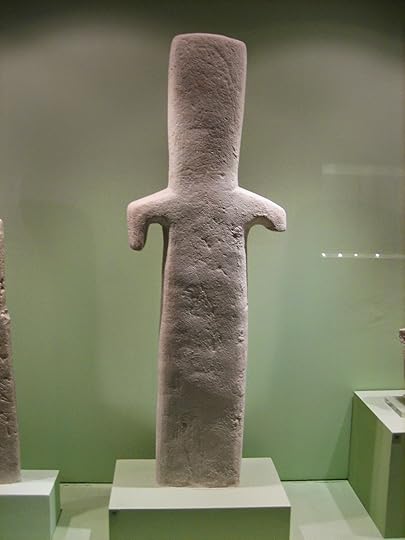 A later stone representation of an xoanon.
A later stone representation of an xoanon.The Orthia was a wooden pillar.I'm going to continue in a similar vein with another myth set in Sparta, not a myth about Sparta. Don't worry, I'll get there.
When the Spartans descended on the Peloponnesus, they brought more than just their sky gods with them. They brought the whole pantheon.
Apollo's twin sister Artemis, the virgin goddess of the hunt, was popular with the Spartans. She was the protector of girls and in Sparta that protection extended to the youths as well. However, she developed a darker aspect here than elsewhere in the world.
When the Dorian's conquered Lacedaemonia, they found a wooden post-like idol of Artemis already present in a willow thicket. This idol became known as Artemis Orthia. Once again, most scholars agree that an older goddess, Orthia was supplanted by the conquering goddess Artemis.
(Lacedaemonia is the name for the land that the Dorians conquered. The Dorian invaders became known as Lacedaemonians or Spartans.)
The idol, known as a xoanon, was a malevolent, nonhuman wooden effigy. Legend says, Spartans from the surrounding four villages quarreled while making sacrifices to Artemis Orthia. Most of the Spartans were killed in the ensuing fight and the remainder died of disease. Whether because of the idol's influence or because a miasma fell upon them due to their blood-guilt is unclear.
Following this, an oracle proclaimed that Orthia's altar must be stained with human blood and human sacrifices by lot were established. When asked why Sparta didn't just follow the practices of the Skythoi (Scythians) and sacrifice captives to the goddess, Apollonius said, "It is not congenial to any of the Greeks to adopt in their full rigor the manners and customs of barbarians (non-Greeks)."
When Lycurgus the lawgiver came to power in Sparta, he altered the custom. The sacrifices were abolished, but to slake the goddess' thirst for blood the youths of Sparta were flogged until they bled. An ordeal known as the Diamastigosis.
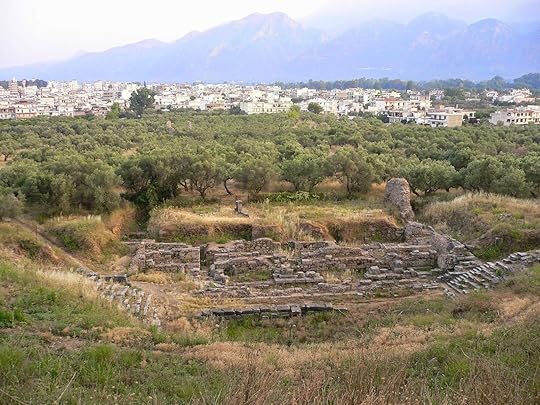 Standing at the rear of the amphitheater
Standing at the rear of the amphitheaterlooking down at the altar of Artemis Orthia.This rite of passage was so popular that an amphitheater was constructed for the audience. During the Roman times the ritual became little more than a blood spectacle that sometimes ended in the death of the young men, coming full circle in a return to human sacrifice. Showing the modern myth that the future is more progressive isn't always the truth.
This is an instance of what is called a "survival", where a former deity, ritual or cult is absorbed into the new reigning deity's sphere. Sometimes only the portions that fit with the new deity's identity are absorbed piecemeal, other times they are engulfed whole. Thus "converting" the followers of the previous god. Or would it be more correct to say subverting the newcomers?
Published on May 30, 2014 20:03
May 26, 2014
Spartan Myths - Apollo Hayakinthios
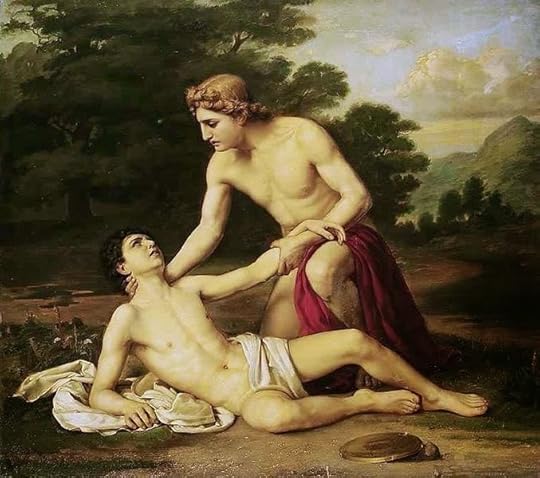 Apollo and the mortally wounded HyacinthusI haven't blogged much recently because no one wants to hear that I took the kids to school today and I think I'll do some writing before I have to go pick them up.
Apollo and the mortally wounded HyacinthusI haven't blogged much recently because no one wants to hear that I took the kids to school today and I think I'll do some writing before I have to go pick them up.While researching Taming Theron and A Spartan Love, I found all kinds of, for lack of a better word, myths about Sparta. Some are just minor things, such as trying to apply a modern mindset to an ancient culture and one that even its contemporaries considered strange. Others are the result of the other Greek city-states giving them bad press. No one really liked the bullies on the block.
So I thought I would start with a real myth and explore its origins.
First the myth. Hyacinthus was a prince of Sparta. Both Apollo and Zephyrus courted the beautiful young man, but Hyacinthus preferred Apollo. One day while Apollo and Hyacinthus were throwing a discus, Zephyrus, the West Wind, blew the disc off course in a fit of jealousy. The discus struck Hyacinthus in the head, killing him.
Apollo was heartbroken. He refused to allow Hades to take the prince to the Underworld. Instead, he gathered the youth's blood to create a flower, the hyacinth. Aphrodite, Athena and Artemis carried the divine hero's body to the Elysium Fields.
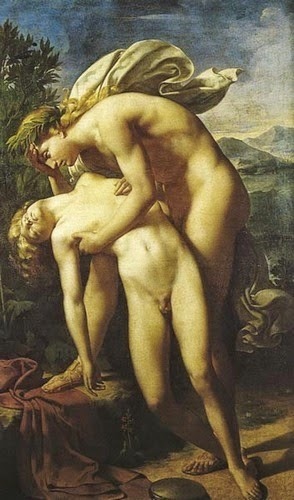 Apollo mourns Hyacinthus
The likely origins.
A tomb to Hyacinthus can be found near Apollo's altar and idol in the village of Amykles southwest of the modern city of Sparta and dates to the Mycenaean era. Most scholars consider Hyacinthus to be a local deity who predated the Spartan's and Apollo. His name with the suffix –nth shows him to be pre-Hellenic. (The Greeks called themselves Hellenes.)
Apollo mourns Hyacinthus
The likely origins.
A tomb to Hyacinthus can be found near Apollo's altar and idol in the village of Amykles southwest of the modern city of Sparta and dates to the Mycenaean era. Most scholars consider Hyacinthus to be a local deity who predated the Spartan's and Apollo. His name with the suffix –nth shows him to be pre-Hellenic. (The Greeks called themselves Hellenes.)When the Doric Spartans invaded the Peloponnesus, they brought their sky gods with them. The Spartans considered Apollo to be one of their patron gods. Since Apollo was one of the most likely to take a male lover, Hyacinthus was quickly accounted as his lover.
As is commonly the case when one god absorbs another's place and prerogatives, the older deity had to die. Hyacinthus met with an "accidental" death at another, although minor, sky god's hands. Apollo stepped in to fill the religious void, laying claim to Hyacinthus' sacred site and becoming known as Apollo Hayakinthios.
Published on May 26, 2014 09:37
May 21, 2014
A Spartan Love
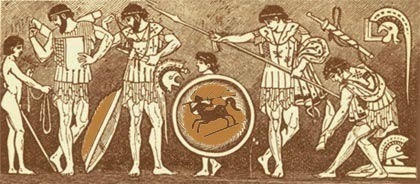 Ancient Greek Battle PrepA Spartan Love is coming along nicely. As is the case with my stories, A Spartan Love has been growing as it goes through my editing/revision process. The original rough draft was about 86K. Now at about 25% through my second draft, it is up to 96K. I have no doubt that it will be 100K+ by the time I submit it.
Ancient Greek Battle PrepA Spartan Love is coming along nicely. As is the case with my stories, A Spartan Love has been growing as it goes through my editing/revision process. The original rough draft was about 86K. Now at about 25% through my second draft, it is up to 96K. I have no doubt that it will be 100K+ by the time I submit it.Most of the growth is due to world building. I try to get as much of that in the rough draft as possible, but it's not until I get the story back from my betas that I find any holes in my descriptions and explanations. Their questions let me know what I need to clarify. Just because I know my world, doesn't mean others do.
So the story gets longer and more involved. With two tiers of betas, that can be quite a bit of additional material tucked in here and there as unobtrusively as possible.
A Spartan Love is as much an adventure as a romance. After all, I'm not going to expect my warriors to avoid battle and valor.
Andreas and Theron live in 5th century BC Sparta. I try to make the somewhat enigmatic city-state of Sparta as historically correct as possible. However, many aspects of their society and thought processes were mysterious even to their neighbors, many of whom hated them and portrayed the Spartans in as bad a light as possible when they actually wrote about them. So sources are hard to come by and often contradictory and/or suspect.
I have also decided to write about the world Andreas and Theron think they live in. So as in Homer, the gods and their lesser brethren are real. As are ghosts, known as shades or phatasma(ta). I'm hoping that the stories retain a feel not unlike Homer's works, although not as flowery and wordy. I'm not really a songsmith.
The goal is to submit A Spartan Love before Taming Theron comes out. That way there will be minimal time separating the stories.
Published on May 21, 2014 07:41



